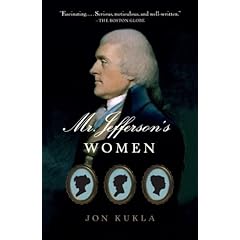Mr. Jefferson's Women

Hundreds of books and articles have been written about Thomas Jefferson’s extraordinary life, genius, and achievements. With few exceptions, however, little was known about the women who figured in Jefferson’s life when I began my research for Mr. Jefferson’s Women. The book become a pioneering inquiry addressing two basic questions: What kinds of relationships did Thomas Jefferson have with women? And, more generally, how did the American Revolution affect the situation of women in society and politics?
As to the first question, my research cast fresh light upon things we thought we knew about Rebecca Burwell, Elizabeth Walker, Martha Jefferson, Maria Cosway, and Sally Hemings. Readers have often expressed appreciation for the care with which I tried to show both sides of these relationships, but the primary-source evidence sometimes led me to surprising, troubling, or controversial conclusions. An angry email message sent after the book was mentioned in the press wondered whether I wrote about Sally Hemings because I was “ignorant or just a pathological liar.”* More interesting and less predictable reactions came from well-informed scholars dismayed by the loss of a favorite story (such as the highly romantic version of the Maria Cosway flirtation) or skeptical about the loss of a cherished assumption. “Do you find Jefferson any more sexist that any other of the founders?” a distinguished historian asked. We need to know more about the others, but the answer (especially after Jefferson’s experience in France) is probably “Yes.” Clearly Mr. Jefferson’s Women does contradict the hopeful essayist who assumed that an “enlightened view of women’s abilities” prompted Jefferson “to extend his democratic ideology to embrace women.”
How did the American Revolution affect the situation of women in society and politics? About a century ago historians began debating the extent to which Americans fought the Revolution was fought for “Home Rule” (against the British) or, in Carl Becker’s famous phrase, “Who should rule at home.” We have long recognized that a “Contagion of Liberty” carried revolutionary ideas beyond the narrow realm of constitutional politics. Not until recent decades (especially when the study of women’s history coincided with the bicentennial of Independence) have scholars begun to ask whether the American Revolution raised the question of “Who shall rule within the home?” The closing two chapters of Mr. Jefferson’s Women sketch Jefferson’s actions and attitudes in the context of the Age of Revolution. Some men of the Enlightenment were more sympathetic toward the situation of women – Benjamin Rush and the Marquis de Condorcet were notable among them. Appalled by some of the things he witnessed in France, Jefferson jealously guarded American achievements of political and religious liberty against real and perceived threats, including what he regarded as the dangerous influence of women.
Rosemarie Zagarri’s important Revolutionary Backlash: Women and Politics in the Early American Republic, published months after Mr. Jefferson’s Women, now offers a larger context for my closing chapters about Jefferson. In time, Americans embraced both “republican motherhood” and the antebellum “cult of domesticity.” The deflection of female aspirations for education, property reform, and civic participation in Jeffersonian America gently echo the Jacobins rigorous suppression of French women and their political activities at the beginning of the Reign of Terror.
On a much lighter note, Mr. Jefferson's Women opened with a tribute to Jefferson's multifaceted genius by way of a playful description of Mr. Peterman's Shirt. As this paperback goes to press, recent catalogues now supplement that original item with a new one: "The J. Peterman Shirt for Women. (49% customer insistence, 48% Thos. Jefferson, 3% Peterman.)"
*Note: The chapter-length discussion of Sally Hemings in Mr. Jefferson’s Women substantially agrees with my friend Annette Gordon-Reed’s newly published The Hemingses of Monticello. The central story told by any 798-page book must inevitably offer far more detail than a 26-page chapter and its 10 pages of endnotes. That said, I believe our only major divergence is whether the Jefferson-Hemings liaison began in Paris ca. 1789 or, as I contend, back at Monticello ca. 1794 after Jefferson’s retirement from Washington’s cabinet.